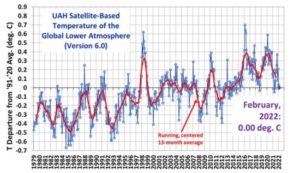by J. Heller, Mar 2, 2022 in ClimateChangeDispatch
Another week and we get another dire report on the climate from the U.N. and again, there is no scientific data showing a direct link between oil use and temperatures, sea levels, and storm activity. [bold, links added]
What they have are computer models.
Here is what they are putting out now:
UN panel’s grim climate change report: ‘Parts of the planet will become uninhabitable’
Life in some locations on the planet is rapidly reaching the point where it will be too hot for the species that live there to survive, international climate experts said in a report Monday.
“With climate change, some parts of the planet will become uninhabitable,” said German scientist Hans-Otto Pörtner, co-chair of Working Group II for the Intergovernmental Panel on Climate Change (IPCC), which produced the report released in Berlin.
The report assesses scientific literature documenting the devastating effects of human-caused climate change on society and ecosystems worldwide.
And, as always, the media just reports these dire reports without asking any questions or doing any research. Five simple questions would be:
- Why have your previous predictions been 100% wrong?
- Why should we believe these predictions and base policies on these predictions when previous predictionshave been completely wrong?
- Shouldn’t policies be based on actual scientific data instead of computer models that can easily be manipulated to get the results you want?
- Should we destroy an industry based on computer models, especially one that has greatly improved the quality and length of life?
- Has the UN ever accomplished anything that indicates it can control the climate?
One prediction we continuously see to scare the public, especially the children, into compliance, is how many species of fossil fuels and humans are causing them to go extinct.
What we never see is actual data from the previous 150 years of fossil-fuel use that have gone extinct.
…

